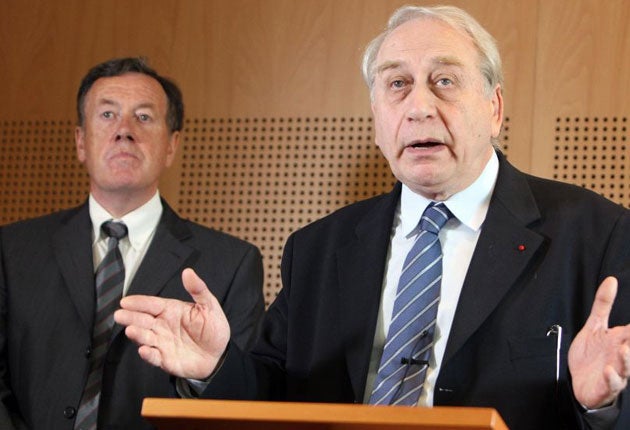French: No sign of problem with Air France jet

Your support helps us to tell the story
From reproductive rights to climate change to Big Tech, The Independent is on the ground when the story is developing. Whether it's investigating the financials of Elon Musk's pro-Trump PAC or producing our latest documentary, 'The A Word', which shines a light on the American women fighting for reproductive rights, we know how important it is to parse out the facts from the messaging.
At such a critical moment in US history, we need reporters on the ground. Your donation allows us to keep sending journalists to speak to both sides of the story.
The Independent is trusted by Americans across the entire political spectrum. And unlike many other quality news outlets, we choose not to lock Americans out of our reporting and analysis with paywalls. We believe quality journalism should be available to everyone, paid for by those who can afford it.
Your support makes all the difference.A French accident investigator said today there were no signs of problems with Air France Flight 447 before takeoff and it was unclear whether the chief pilot was at the controls when the plane plunged into the Atlantic Ocean.
The head of France's accident investigation agency, Paul-Louis Arslanian, also said he was "not optimistic" that rescuers will recover the plane's black boxes, believed to be on rugged terrain miles under the sea.
The plane, carrying 228 people, lost contact with ground controllers after leaving Rio de Janeiro for Paris on Sunday night. The crew made no distress call before the crash, but the plane's system sent an automatic message just before it disappeared, reporting lost cabin pressure and electrical failure.
The reason for the crash remained unclear, with fierce thunderstorms, lightning or a catastrophic combination of causes as possible theories.
Arslanian told a news conference at Le Bourget airport north of Paris that investigators were studying the plane's maintenance and other records, and that there were "no elements" suggesting the plane had problems before takeoff.
He stressed the investigation was only beginning and was likely to last long. He said investigators didn't have enough information to determine whether the plane broke up in the air or upon impact with the sea.
"We don't even know the exact time of the accident," he said.
Asked whether the chief pilot was in the cockpit when the plane went down, Arslanian said, "We don't have for the time being the answer." Pilots on long-haul flights often take turns at the controls to remain alert.
"Until the last minute we all hoped it was just a normal loss of contact. It's very difficult to accept such a disaster," he said.
Military planes and ships from Brazil and France homed in today on the bobbing wreckage of the Air France jet, 400 miles northeast of the Fernando de Noronha islands off Brazil's northern coast, where an airplane seat, a fuel slick and pieces of white debris were spotted a day earlier.
Rescue boats from several nations were sailing toward the site to start the recovery.
Arslanian said if rescuers don't find the black boxes, investigators should be prepared to continue the probe without them.
The man in charge of the investigation, Alain Bouillard, led the probe into the 2000 crash of the Concorde supersonic jet. He said today the accident investigation agency, known by its French acronym BEA, would submit its first preliminary report by the end of June.
Join our commenting forum
Join thought-provoking conversations, follow other Independent readers and see their replies
Comments